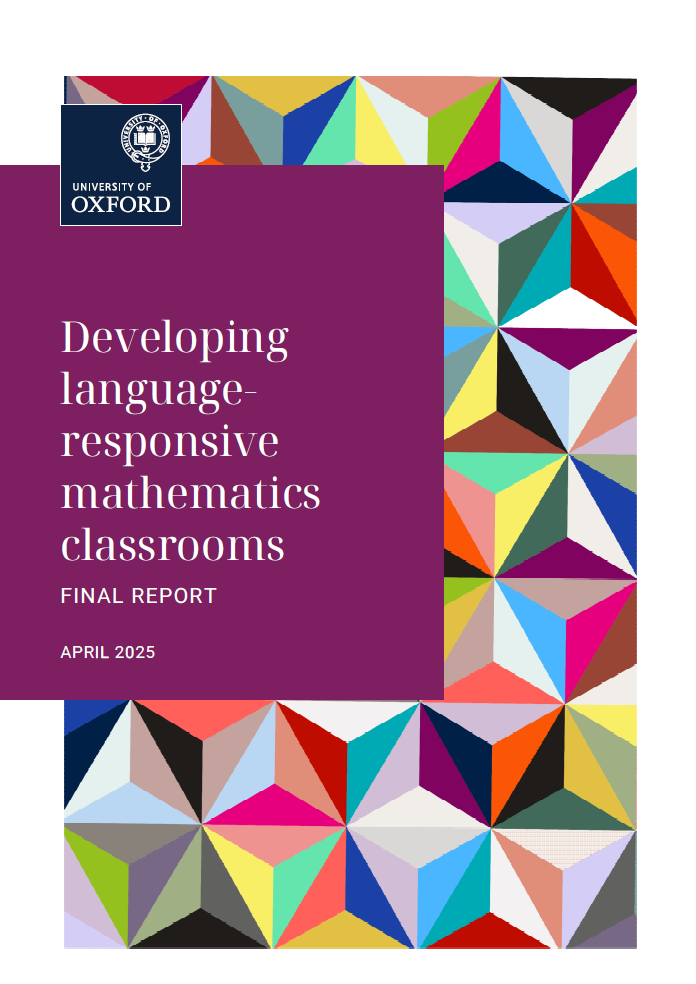Mindsets and Diversity: understanding and addressing attainment gaps amongst Oxford undergraduates in highly mathematical subjects
The Project
This project aims to explore undergraduate students’ academic self-concept, perceptions of mathematics, statistics and physics, and mindset, in order to examine the influence these factors have on university examination performance and decisions to continue study after the first 3 years for different groups of students.
We are examining the interrelationships between gender, ethnicity, and background characteristics, measures of self-concept and mindset, and examination performance in order to identify potential groups of undergraduate students who are underperforming relative to their peers. We are then using these findings to develop and evaluate interventions aimed at these particular groups.
This study involves the Mathematical Institute, Computer Science Department, Statistics Department and Physics Department.
Key aims of the project
- Understand attitudinal factors affecting underperformance of some groups of Oxford undergraduates in highly mathematical subjects
- Understand attitudinal factors affecting progression to further study amongst Oxford undergraduates in highly mathematical subjects
- Develop and pilot interventions to address attainment gaps and continuation gaps, based on the findings
External project members include, Dr Vicky Neale (PI) and Professor Ursula Martin (CI).
More Projects
-
Effectiveness Trial for the Evaluation of the Mathematical Reasoning Programme for Year 2 Pupils Using an Online Professional Development Training ModelFebruary 2024 - March 2026The Mathematical Reasoning (MR) programme aims to promote pupils’ understanding of numbers and number sense (encompassing additive composition of number and place value, and the inverse relation between addition and subtraction) and quantitative reasoning and problem solving (different relations that can be established between quantities, encompassing part whole or additive relations, and one to many correspondence or multiplicative relations).
-
Online Professional Development for Delivering the Mathematical Reasoning Programme in Year 2November 2022 - October 2023This EEF-funded pilot evaluation aims to assess if the Online Teacher Training to implement the Mathematical Reasoning Programme is acceptable to teachers and effective in preparing them and their supporting TAs to deliver the programme.
-
Improving Working Memory Plus Arithmetic (IWM+A)November 2020 - July 2022Working memory – the ability to keep information in mind and use it to guide behaviour – is a fundamental element of learning and underpins many activities that children do at school, including understanding number and arithmetic.
-
Supporting secondary mathematics teachers to enhance their students’ proof competenciesJanuary 2020 - February 2021A primary aim of school mathematics is to enhance all students’ ‘proof competencies’, i.
-
Pedagogic and organisational mediation of experience in schoolsJanuary 2018 - May 2019Pupils’ experience of learning, relating and belonging are crucial to their participation, engagement and wellbeing in school.
-
Argumentation in Religion and ScienceSeptember 2018 - August 2021Teachers and pupils often face difficult judgments that demand understanding of various kinds of information, opinion, values and ethical principles, and understanding of different processes of argumentation, deliberation and debate.
More News
-
 NewsCOVID-19: Department publishes home-schooling resource for parents and teachersMarch 30, 2020
NewsCOVID-19: Department publishes home-schooling resource for parents and teachersMarch 30, 2020 -
 NewsSibel Erduran appointed to the PISA 2024 Science Framework Strategic Visioning Expert GroupFebruary 10, 2020
NewsSibel Erduran appointed to the PISA 2024 Science Framework Strategic Visioning Expert GroupFebruary 10, 2020
Project Details
More Projects
-
Effectiveness Trial for the Evaluation of the Mathematical Reasoning Programme for Year 2 Pupils Using an Online Professional Development Training ModelFebruary 2024 - March 2026The Mathematical Reasoning (MR) programme aims to promote pupils’ understanding of numbers and number sense (encompassing additive composition of number and place value, and the inverse relation between addition and subtraction) and quantitative reasoning and problem solving (different relations that can be established between quantities, encompassing part whole or additive relations, and one to many correspondence or multiplicative relations).
-
Online Professional Development for Delivering the Mathematical Reasoning Programme in Year 2November 2022 - October 2023This EEF-funded pilot evaluation aims to assess if the Online Teacher Training to implement the Mathematical Reasoning Programme is acceptable to teachers and effective in preparing them and their supporting TAs to deliver the programme.
-
Improving Working Memory Plus Arithmetic (IWM+A)November 2020 - July 2022Working memory – the ability to keep information in mind and use it to guide behaviour – is a fundamental element of learning and underpins many activities that children do at school, including understanding number and arithmetic.
-
Supporting secondary mathematics teachers to enhance their students’ proof competenciesJanuary 2020 - February 2021A primary aim of school mathematics is to enhance all students’ ‘proof competencies’, i.
-
Pedagogic and organisational mediation of experience in schoolsJanuary 2018 - May 2019Pupils’ experience of learning, relating and belonging are crucial to their participation, engagement and wellbeing in school.
-
Argumentation in Religion and ScienceSeptember 2018 - August 2021Teachers and pupils often face difficult judgments that demand understanding of various kinds of information, opinion, values and ethical principles, and understanding of different processes of argumentation, deliberation and debate.
More News
-
 NewsCOVID-19: Department publishes home-schooling resource for parents and teachersMarch 30, 2020
NewsCOVID-19: Department publishes home-schooling resource for parents and teachersMarch 30, 2020 -
 NewsSibel Erduran appointed to the PISA 2024 Science Framework Strategic Visioning Expert GroupFebruary 10, 2020
NewsSibel Erduran appointed to the PISA 2024 Science Framework Strategic Visioning Expert GroupFebruary 10, 2020










